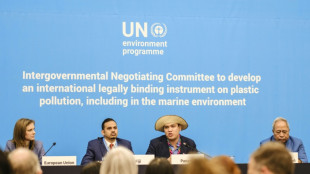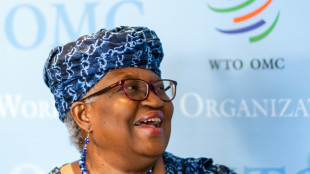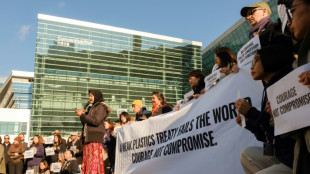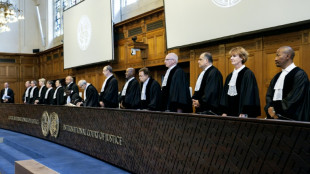
-
 Namibia reopens polls after election chaos in ruling party test
Namibia reopens polls after election chaos in ruling party test
-
Georgia police arrest dozens in clashes with pro-EU protesters

-
 Leclerc on top for Ferrari in Qatar GP practice
Leclerc on top for Ferrari in Qatar GP practice
-
Amorim puts faith in Mount to turn around Man Utd career

-
 Guardiola will not 'run' from Man City rebuild
Guardiola will not 'run' from Man City rebuild
-
Assisted dying campaigners, opponents rally at UK parliament

-
 Durable prop Healy set to carve name in Irish rugby history
Durable prop Healy set to carve name in Irish rugby history
-
Macron unveils Notre Dame after 'impossible' restoration

-
 Traumatised Spain marks one month since catastrophic floods
Traumatised Spain marks one month since catastrophic floods
-
Attack-minded Spurs boss Postecoglou says: 'You'll miss me when I'm gone'

-
 Syria jihadists, allies shell major city Aleppo in shock offensive
Syria jihadists, allies shell major city Aleppo in shock offensive
-
Macron inspects 'sublime' Notre Dame after reconstruction

-
 Arsenal must be near-perfect to catch Liverpool, says Arteta
Arsenal must be near-perfect to catch Liverpool, says Arteta
-
Arrests, intimidation stoke fear in Pakistan's politics

-
 Showdown looms on plastic treaty days before deadline
Showdown looms on plastic treaty days before deadline
-
Ngozi Okonjo-Iweala: the WTO's trailblazing motivator

-
 British MPs debate contentious assisted dying law
British MPs debate contentious assisted dying law
-
Macron offers first glimpse of post-fire Notre Dame

-
 Syria jihadists, allies shell Aleppo in shock offensive
Syria jihadists, allies shell Aleppo in shock offensive
-
Japan government approves $92 bn extra budget

-
 Toll in Syria jihadist-army fighting rises to 242: monitor
Toll in Syria jihadist-army fighting rises to 242: monitor
-
UK transport secretary quits in setback for Starmer

-
 Days before deadline, plastic treaty draft highlights disagreement
Days before deadline, plastic treaty draft highlights disagreement
-
Crypto boss eats banana art he bought for $6.2 million

-
 Teen news boss criticises Australian social media ban
Teen news boss criticises Australian social media ban
-
Taiwan detects 41 Chinese military aircraft, ships ahead of Lai US stopover

-
 Spain urged to 'build differently' after deadly floods
Spain urged to 'build differently' after deadly floods
-
WTO chief faces heavy task as Trump threat looms

-
 Herbert takes control at Australian Open as Smith tanks
Herbert takes control at Australian Open as Smith tanks
-
Israel PM again warns Iran after top diplomat talks of revising nuclear doctrine

-
 Brilliant Brook's 132 puts England on top against New Zealand
Brilliant Brook's 132 puts England on top against New Zealand
-
US landmine offer to Ukraine throws global treaty into 'crisis': campaign group

-
 Singapore hangs 4th person in three weeks
Singapore hangs 4th person in three weeks
-
Five things to know about NewJeans' shock split from agency

-
 Waste pickers battle for recognition at plastic treaty talks
Waste pickers battle for recognition at plastic treaty talks
-
Ireland votes in closely fought general election

-
 Top UN court to open unprecedented climate hearings
Top UN court to open unprecedented climate hearings
-
European countries that allow assisted dying

-
 British MPs to debate contentious assisted dying law
British MPs to debate contentious assisted dying law
-
Schmidt not expecting hero's welcome on Ireland return

-
 PSG stuck between domestic dominance and Champions League woes
PSG stuck between domestic dominance and Champions League woes
-
'Hot fight' as unbeaten Bayern visit Dortmund fortress

-
 Bordeaux-Begles' Samu 'not finished yet' with Wallabies
Bordeaux-Begles' Samu 'not finished yet' with Wallabies
-
Brook and Pope half-centuries haul England to 174-4 against NZ

-
 Yen rallies on rate hike bets as equity markets swing
Yen rallies on rate hike bets as equity markets swing
-
Ukraine superstar Mahuchikh brings 'good vibes' to her war-torn country

-
 PlayStation at 30: How Sony's grey box conquered gaming
PlayStation at 30: How Sony's grey box conquered gaming
-
Saudi Arabia hosts UN talks on drought, desertification

-
 PlayStation: Fun facts to know as Sony's console turns 30
PlayStation: Fun facts to know as Sony's console turns 30
-
Nepal's first transgender candidates run for local office


Malaysia's 'stupid' football naturalisation drive gets red card
A drive to ramp up Malaysia's footballing fortunes with naturalised players has failed, critics say, with the national team no nearer a first World Cup appearance and soul-searching about the state of the game in the country.
Football is among the most popular sports in the nation of more than 30 million people but at international level Malaysia are minnows -- 154th in the FIFA rankings, a spot below tiny Andorra.
Long-suffering Malaysian fans had high hopes when football authorities launched the naturalisation programme in 2018, ahead of qualifying for the 2022 World Cup in Qatar, and several overseas-born players were handed citizenship.
But the scheme was put on hold in August after Malaysia's tilt at the World Cup came up short once more, with naturalised players taking some of the flak.
Already naturalised players can still play for the country but there will be no new ones coming through the door in the near future.
Santokh Singh, who played for the national side in the 1970s and 1980s -- better times -- said there should be a renewed focus on training local players.
"We've got so many good local players who are capable of performing better than the foreigners... they are not getting a chance to play," the 69-year-old told AFP.
"Naturalisation of players is stupid."
Malaysia is among a number of countries that have sought to raise the level of their national squad by giving foreign players citizenship.
From China and Japan to Mexico and even Spain, it has become a growing trend, with footballers from Brazil particularly popular.
But it has provoked controversy, with some, such as wealthy Qatar, accused of stacking their teams with foreigners with little connection to the country they are representing.
- 'Invaders from Brazil' -
In 2007, FIFA's then-president Sepp Blatter warned about "invaders from Brazil" flooding national sides and the governing body has tightened the rules.
Those without ancestral connections to a country must have been resident there for at least five years before qualifying to play for its national side.
In Malaysia's case, Gambia-born Mohamadou Sumareh was the first player given citizenship as part of the naturalisation drive, making his debut for the national side in 2018.
He began playing for Malaysian clubs in 2013 and is currently a winger for Johor Darul Ta'zim (JDT), who won the top-flight Super League eight times from 2014.
He was followed by Liridon Krasniqi, born in the former Yugoslavia, and Brazil-born Guilherme de Paula.
More common are players who grew up overseas but have a Malaysian parent and decide to return to Malaysia, where they stand a better chance of playing international football.
The naturalisation project faced fierce criticism after Malaysia lost in World Cup qualifiers to Vietnam and the UAE in June last year, dashing their hopes of reaching Qatar.
Two months later the Football Association of Malaysia (FAM) said the scheme was being put on hold.
The body plans to "conduct further studies into several aspects of the programme", FAM general-secretary Mohamad Saifuddin Abu Bakar told AFP.
- Deep-rooted problems -
Some believe Malaysia should focus on solving deep-rooted problems, rather than emphasising too heavily the failings of the naturalisation project.
"I think there are more important structural issues to bring long-term success," Steve Darby, a coach and football consultant who spent years working in Asia, including in Malaysia, told AFP.
"Improve training facilities and also stadium pitches."
While they have never been serious rivals to the region's best sides, like Japan and South Korea, Malaysia's national team has seen better days.
The country qualified for the Moscow Olympics in 1980, but withdrew when Malaysia joined a US-led boycott of the Games in protest at the invasion of Afghanistan.
The national side won berths in the Asian Cup, which pits the region's top national teams against one another every four years, in 1976 and 1980.
Not everyone is critical of the naturalisation project, believing it can have good results if part of a broader strategy.
B. Sathiananthan, Malaysia's national coach from 2007-2009, said it was understandable that coaches sometimes looked to the policy.
"If you are given a two-year contract, do you think you can wait for local players to hit form?" he said.
G.Machado--PC
